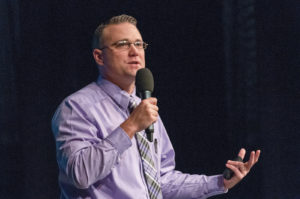
At a recent bystander training, over 30 students were educated on how they can make a positive impact on their community by being observant of and compassionate to fellow students.
The training is designed to make MWCC’s campuses stronger and safer, said Jason Zelesky. Most problematic behaviors that happen on college campuses involve bystanders, or those who see a behavior or incident and are not directly involved, who have the potential to influence positive change and avoid larger problems.
“The training is offered to create an environment where the behavior won’t get to a critical level and people won’t have to intervene,” said Zelesky. “We have the ability to change our community.”
The bystander training, which has been run for four years at MWCC, is designed to address issues of violence, whether they are domestic or interpersonal, but the training goes beyond that, said Zelesky. The training is designed to give students not only the tools to act when needed, but look at situations with a more compassionate eye. In doing so, they will hopefully decide to step up and interact with students who might just need a person to ask how they are doing.
“If we intervene at that early level we can avoid escalation,” said Zelesky. “Being a bystander is about finding a safe way to intervene … if you see something, say something. Reach out. Tap someone on the shoulder.”
Student Leader in Civic Engagement Laryssa Truesdale participated in the training last year. She said it gave her a perspective and skills she will carry forward with her into the future.
“I was impacted by the bystander training tremendously, I learned new tools to help my fellow students on campus and community members. The bystander training opened my eyes up,” she said.
The bystander training was put on by MWCC’s Student Life department and is held every semester for students and offered to staff as well.

